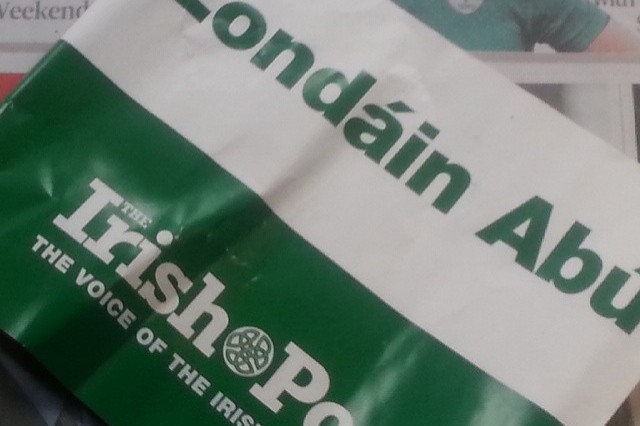
It has been a good week for the Irish in Britain. Or at least this Irishman in Britain. On Wednesday, in a pub in North London, I saw one of our (and the world’s) greatest living poets, Eavan Boland, give a brilliant interview to journalist JP O’Malley covering swathes of Irish identity, gender, art, and politics.
On Friday, I managed to come out of the Cheltenham Gold Cup 50p up , using my time-tested strategy of “bet on whatever Ruby Walsh is riding”. It’s Saturday morning now, so I’m not going to jinx our rugby and cricket teams by suggesting this enjoyable run will continue. Meanwhile, Saint Patrick’s Day celebrations will take place across Irish diaspora communities in Britain right up until the day itself on Tuesday. The sun is shining in my London Irish neighbourhood, where I can buy every Irish food I can imagine, read every Irish regional paper, and listen to live traditional music in welcoming pubs most nights of the week. I like being Irish in London.
But as always, the silver lining carries its cloud. According to the Daily Mirror this morning, the Jeremy Clarkson controversy at the BBC has escalated considerably. The paper reports that the BBC investigation into Clarkson’s “fracas” with Top Gear producer Oisin Tymon will be told that: “[Clarkson] called Oisin a “lazy, Irish c***” before splitting his lip with a punch that left the 36-year-old with blood running down his face and needing treatment in A&E.”
If this account is true (Clarkson is said to deny it, it should be noted), then this is racially aggravated assault, no different than if Clarkson had abused a black, Asian or Jewish colleague.
This does not seem to deter the hundreds of thousands of Clarkson fans who will, presumably, condone racism as classic banter, just as they have condoned violence.
The queer thing about anti-Irish racism (and its partner, anti-Catholicism), is that a hell of a lot of British people are in denial about its existence (trust me, Irish people are not). It was, certainly, worse during the “Troubles”, but there is a mistaken belief that the Troubles was the sole reason for anti-Irish feeling.
In truth, of course, it is a hell of a lot more complicated than that. Ireland was one of the first colonies: justification for all colonisation, then as now, is partly found in the dehumanisation of the conquered. The Irish, with their distinct laws, customs and language, were not really fit to rule themselves (how often is that sentiment echoed today?); we were not diligent, we were not to be trusted: they were, as Mr Clarkson would have it, “lazy Irish cunts”.
Every so often, a well-meaning British liberal friend will either a) declare matily that “we’re all the same” and what the hell was all that fighting about, eh? or b) inquire archly about whether, considering the decades of quasi-theocracy the Irish republic endured, and the apparent corruption of the political system, was the whole independence thing really worth it?
And every time, you remind them: yes. We were a colony. We were stripped of land, language, identity. We were routinely demonised and patronised.
Of course, there is complexity in this: over 800 years, things are bound to get complicated. People moved back and forth, some colonists became “more Irish than the Irish themselves”, some Irish people took enthusiastically to Britishness and the British empire. Many more joined the civil service, the police, the army out of simple economic necessity.
But the fight for freedom was worth it, because at least most people in Ireland now have some control of the country’s future. No revolution was ever perfect: the idyllic republic has never been achieved. But at least we can make some attempt to achieve it on our terms.
And it needed to be on our terms because we were not, and never would be viewed as equals by the British establishment. Every Irish person in Britain knows the little nod, the little wink. More often now it is disguised as affection, or indulgence (“Oh, you funny people” is always implied). But the undertones are the same: feckless, violent, drunken. And occasionally, someone like Clarkson, who, as better writers than I have pointed out, is simultaneously at the very heart of the Establishment while feigning to rail against it, will let it all spill out, in full vitriol. And we’re back with an image that easily resonates with Irish people: an English toff assaulting a “lazy” Irish lackey for not doing his bidding. What we hoped we’d be able to leave behind.
Still, Happy St Patrick’s Day.